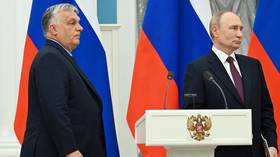A possible future use for bitcoin? Russian bank issues loan using cryptocurrency as collateral for first time
A Russian bank has issued a loan secured by cryptocurrency for the first time ever, marking a new milestone in the history of the controversial digital alternatives to existing financial instruments.
The loan, issued by Expobank to businessman Mikhail Uspensky, used the currency known as ‘waves’ as collateral. It was founded by Ukrainian entrepreneur Alexander Ivanov in 2016. However, the loan amount and terms of the agreement have not been made public.
Cryptocurrencies such as waves and bitcoin have, until recently, been in a legal grey zone inside Russia. Earlier this year, Russian President Vladimir Putin signed a law that officially allows the buying and selling of crypto, but does not recognize it as legal tender. Therefore, any cryptocurrency assets used as collateral are deemed to be “other property,” instead of fiat currency.
https://t.co/7ZIulrkabY First loan backed by #crypto in Russia, with $waves as collateral
— Sasha Ivanov (@sasha35625) August 19, 2020
“For the first time in Russia, a structured transaction using a digital asset was carried out with the participation of a bank,” an Expobank statement said. “The borrower was given a loan, secured by blockchain tokens.”
Alexander Zhuravlyov, the managing partner of the EDR law firm, which advised the bank on the transaction, noted that crypto-assets can be used as collateral as they can be exchanged for actual currency. “This is an important stage for cryptocurrencies in Russia, as it shows that digital assets can be widely used and applied in real life,” he said.
Another lawyer, Yuri Brisov, told Russian newspaper RBK that there is no question about the legality of the loan, as “restrictions on the circulation of non-payment tokens do not exist.”
Expobank, which is based in Moscow and owned by economist Igor Kim, was previously controlled by the British bank Barclays.
Also on rt.com Putin signs law legalizing Bitcoin & other cryptocurrencies, lifting them out of Russian legal 'grey-zone'Think your friends would be interested? Share this story!












